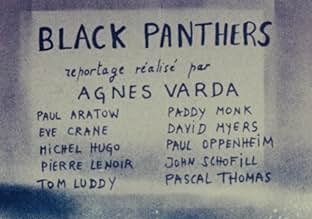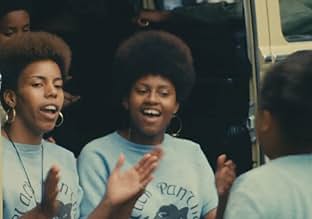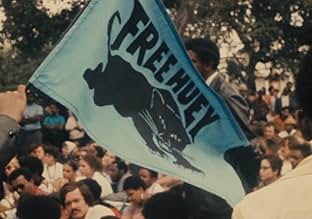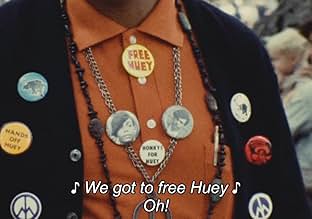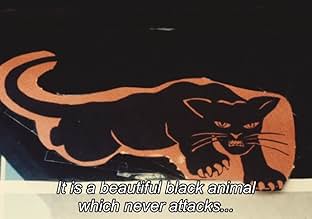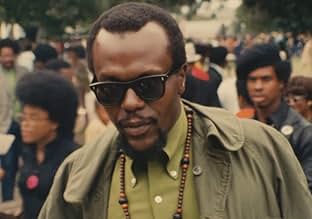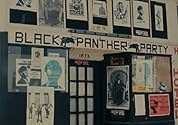VALUTAZIONE IMDb
7,4/10
2956
LA TUA VALUTAZIONE
Un cortometraggio con interviste e proteste a una parata per la liberazione di Huey P. Newton.Un cortometraggio con interviste e proteste a una parata per la liberazione di Huey P. Newton.Un cortometraggio con interviste e proteste a una parata per la liberazione di Huey P. Newton.
H. Rap Brown
- Self
- (non citato nei titoli originali)
Ron Dellums
- Self
- (non citato nei titoli originali)
James Forman
- Self
- (non citato nei titoli originali)
Bobby Seale
- Self
- (non citato nei titoli originali)
Recensioni in evidenza
In 1968 the Black Panther Party (BPP) was at its most active and probably its height of popularity. This very brief documentary has several interviews/speeches which give a quick glimpse into what the BPP was demanding. There is footage of Kathleen Cleaver, Stokely Carmichael, and Huey Newton (one of the founders of the BPP). Kathleen and Stokely are two very well-spoken civil rights activists, or freedom fighters if you dare, and that is evident in this short documentary. At the time of this documentary Huey P. Newton, , was locked up for getting into a shootout with police. There is a little commentary from the documentarian, Agnes Varda, but just about everything else comes from the mouths of the Panthers themselves.
Since Agnès Varda died recently, I decided to watch two of her short documentaries filmed in the San Francisco Bay Area. One is "Uncle Yanco", about her relative in Sausalito. But the more important one is "Black Panthers". This half-hour doc focuses on a Black Panther rally in Oakland in August, 1968. The main purpose of the rally is to call for the release of Huey Newton, in jail on charges of killing a cop. But the rally touches on a number of other things: police brutality towards the black community, the Vietnam War, and calls for worldwide unity against imperialism. In fact, one interviewee lays out several demands that the black community is making in its call for justice (freedom, decent housing, well-paying jobs, good education, etc). There's also an interview with Newton in jail, where he details the horrible treatment that he experiences.
Contrary to what a lot of people like to say, the Black Power Movement was not about "hating white people". It was about teaching the black community to defend itself and recognize the beauty in, among other things, natural hair. The Black Lives Matter movement is the heir to this.
Definitely watch this doc.
Contrary to what a lot of people like to say, the Black Power Movement was not about "hating white people". It was about teaching the black community to defend itself and recognize the beauty in, among other things, natural hair. The Black Lives Matter movement is the heir to this.
Definitely watch this doc.
The Black Panthers are organizing in Oakland to rally for Huey P. Newton's freedom. He and Bobby Seale had used their second amendment freedom to monitor the police force which was well-known to be oppressive. It talks about the killing of an unarmed young black man by the police. It's a documentary of the black power movement of that time. It sounds very familiar. There are differences. It's a bigger movement today and a more wide-spread one. Back in the day, the mostly black movement has to deal with the Vietnam war but most other issues remain the same. There is a bending toward justice over the years and it's always interesting to see the progression.
Black Panthers (original title) is listed by IMDb with the title "Huey" (1968). However, we saw it with the original title. This half-hour documentary was directed by the French filmmaker Agnès Varda.
Varda went to a Black Panther rally in Oakland. The Panthers were demanding that the government free Huey Newton, co-founder of the Black Panther party. Newton was on trial, accused of murdering a police officer.
Beside filming the rally itself, Varda filmed an interview with Newton himself while he was in jail, In addition, she interviewed or recorded H. Rap Brown, Stokely Carmichael, Bobby Seale, and Eldridge Cleaver.
The Black Panthers Party was a revolutionary party, and they made no secret of the necessity to use violence to obtain their goals. They considered themselves at war with the Oakland Police Department. (Probably, the feeling was mutual.)
This is a historically important movie, especially for those who aren't old enough to remember the events of the late 1960's. It's also a lesson in the craft of documentary filmmaking, as exemplified by Agnès Varda. I would sum it up as "speak softly, but get the footage you need."
We saw this film at the wonderful Dryden Theatre in the George Eastman Museum in Rochester, NY. It's part of a Varda retrospective, co-sponsored by Rochester Institute of Technology and the Eastman Museum. I'm sure it will work well on the small screen.
P.S. Newton was eventually convicted of manslaughter, but a higher court overturned the verdict. He had two more trials, both of which ended in hung juries. Ultimately, the government gave up.
Varda went to a Black Panther rally in Oakland. The Panthers were demanding that the government free Huey Newton, co-founder of the Black Panther party. Newton was on trial, accused of murdering a police officer.
Beside filming the rally itself, Varda filmed an interview with Newton himself while he was in jail, In addition, she interviewed or recorded H. Rap Brown, Stokely Carmichael, Bobby Seale, and Eldridge Cleaver.
The Black Panthers Party was a revolutionary party, and they made no secret of the necessity to use violence to obtain their goals. They considered themselves at war with the Oakland Police Department. (Probably, the feeling was mutual.)
This is a historically important movie, especially for those who aren't old enough to remember the events of the late 1960's. It's also a lesson in the craft of documentary filmmaking, as exemplified by Agnès Varda. I would sum it up as "speak softly, but get the footage you need."
We saw this film at the wonderful Dryden Theatre in the George Eastman Museum in Rochester, NY. It's part of a Varda retrospective, co-sponsored by Rochester Institute of Technology and the Eastman Museum. I'm sure it will work well on the small screen.
P.S. Newton was eventually convicted of manslaughter, but a higher court overturned the verdict. He had two more trials, both of which ended in hung juries. Ultimately, the government gave up.
While Agnes Varda was in California shooting "Uncle Yanco", she made this short documentary about a rally to free Huey Newton after he had been jailed, as the documentary tells us, a shoot-out with the police that ended with ten people injured and one cop dead.
Mme. Varda shoots and edits this as an anthropological study, with only Back people speaking; indeed, you have to look carefully to spot a Caucasian in the background. Having grown up in this era, I note that it's a useful corrective to the usual coverage of events like this, in which one heard White people talking about the racial divide and how to deal with it.
Mme. Varda shoots and edits this as an anthropological study, with only Back people speaking; indeed, you have to look carefully to spot a Caucasian in the background. Having grown up in this era, I note that it's a useful corrective to the usual coverage of events like this, in which one heard White people talking about the racial divide and how to deal with it.
Lo sapevi?
- QuizThis film is included in "Eclipse Series 43: Agnès Varda in California", released by Criterion.
- Citazioni
Narrator: The panther was chosen as their symbol. It is a beautiful black animal which never attacks, but, defends itself ferociously.
- ConnessioniFeatured in Berkeley in the Sixties (1990)
I più visti
Accedi per valutare e creare un elenco di titoli salvati per ottenere consigli personalizzati
Dettagli
Contribuisci a questa pagina
Suggerisci una modifica o aggiungi i contenuti mancanti

